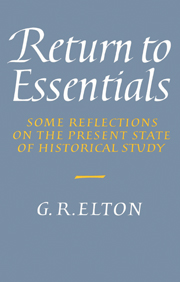2 - The Burden of Philosophy
Published online by Cambridge University Press: 05 June 2012
Summary
I have so far tried to show that what I have called ideological theory threatens the work of the historian by subjecting him to predetermined explanatory schemes and thus forcing him to tailor his evidence so that it fits the so-called paradigm imposed from outside. The alternative onslaught committed by theory is in its way more devastating still because it denies the very possibility of treating the past as having happened independently from the historian who supposedly is at work on it. While the first form of theory submits to the constructs of the social sciences, the second accepts service with psychology and language studies, out of which there have grown special forms of literary criticism. The first attacks history through its substantive content, the second gets under its guard through the fact that the historian has to express himself in words. Partly because this second attack is relatively recent, and partly because it took its origin from characteristically charismatic Frenchmen, it is in some ways more comprehensively menacing – or at least one less warded off so far. Victims of the virus acquire a dangerous sense of intellectual well-being, a cocooned contentment. It has proved particularly insidious in the United States where the intellectual community (as it styles itself) is always inclined to accept most humbly the latest fashions, and it has particularly infected the history of ideas which by its very nature is liable to lose contact with reality.
- Type
- Chapter
- Information
- Return to EssentialsSome Reflections on the Present State of Historical Study, pp. 27 - 49Publisher: Cambridge University PressPrint publication year: 1991



